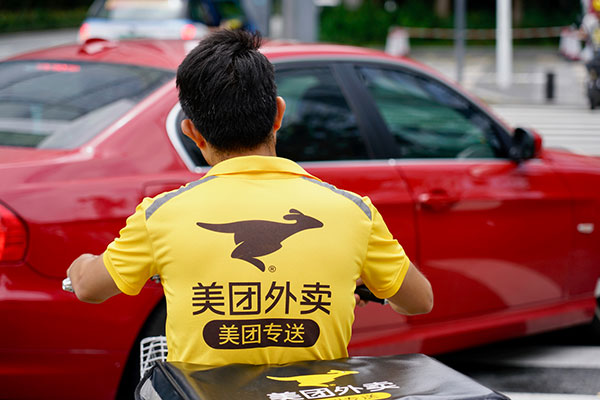The investment trusts that offer the most exciting long-term growth prospects
As economic leadership and dynamism increasingly passes from West to East, Asia-focused trusts take var…
13th July 2020 14:58
by Fiona Hamilton from interactive investor
As economic leadership and dynamism increasingly passes from West to East, Asia-focused trusts take various approaches on how to maximise returns.

Wondering where to find the most exciting long-term growth prospects? Then note the views of the UK’s most impressive global fund manager.
Over the last 10 years, James Anderson has achieved net asset value (NAV) total returns of 570% for Scottish Mortgage Trust(SMT), lifting its net assets to over £11 billion in the process.
For much of that time he has held a substantial US weighting, but his enthusiasm for Asia, and for China in particular, has been gathering momentum. “It seems increasingly clear to us that the geographic centre of the global economy continues to move to Asia, generally at an accelerated pace” he stated in SMT’s recent annual report.
“Before and beyond the virus we have been disconcerted by the extent to which business model leadership and systemic dynamism appear to be fading in America, even on the West Coast. This, too, appears to be in contrast to Asia and, in the world of corporate giants, particularly relative to China.”
It’s been an interesting year for Asia-watchers, with north-east Asia controlling at least the first iteration of the Covid-19 pandemic relatively quickly, while south-east Asia has had a more protracted struggle. Meanwhile, tensions between the US and China (which accounts for around 45% of the MSCI All Country Asia ex Japan index, excluding 9% in Hong Kong) have been evident on numerous fronts.
Apart from ongoing tussles over tariffs, they have included the ban on collaboration with Huawei which threatens the rollout of 5G, and China’s imposition of new national security legislation on Hong Kong – which has been widely condemned in the West, but pragmatically accepted by many local businesses.
More on Asia-focused trusts
- Will these investment trusts be future winners?
- Pacific Assets’ Doug Ledingham on why Asia ESG pioneer is set for bounceback
- Investment Trust Awards 2020: Best Asia-Pacific Trust
Anderson observes that rising tensions between the US and China are not going to go away, but he is less worried that they will undermine opportunities in China than about the mounting schisms in US society. He is unconcerned about Chinese companies being delisted in the US as they can move their quotes to Hong Kong, and he does not expect delisting to protect US companies from mounting competition from the East.
He points out that the Chinese market is so huge that it offers “an enormous opportunity set”. Meituan-Dianping’s food delivery service (pictured below), for instance, is 10 times larger than anything in North America.
The Chinese market is also exceptionally entrepreneurial and innovative. He gives an example: “Alibaba is arguably the most valuable company in the world [and has made] extraordinary progress in rewriting the banking system, in a way that is miles ahead of the US.”
The downside of this dynamic corporate environment is that even market leaders can be overtaken and disenfranchised, as Baidu has been. “There is a pattern of continuous reinvention, unlike anything happening in the US,” Anderson declares.
The only Baillie Gifford-managed investment trust specialising in the Asia Pacific ex Japan region is Pacific Horizon (PHI). Its performance has been increasingly impressive in the six years since Ewan Markson-Brown took charge and followed Anderson’s example by focusing on the most exciting growth companies in the region.
Markson-Brown suggests the Covid-19 pandemic will prove just “a blip in human progress” and expects Asia to continue to offer great opportunities due to its strong demographics, productivity growth, and the rapid pace of technological change. He has been broadening Pacific Horizon’s portfolio both geographically and sectorally, with China and a tiny exposure to Hong Kong together accounting for only 37%, whereas South Korea and Vietnam are both substantially overweight at 21% and 7%, compared with the MSCI All Country Asia ex Japan index.
Singapore-quoted digital entertainment company SEA is his largest holding, followed by JD.com (a huge e-commerce retailer), then Alibaba, Samsung SDI and Li Ning, a premier sports brand. Reflecting its success, PHI’s shares have recently traded at a premium.
The largest trust in the region is Schroder AsiaPacific (SDP), which has been managed since 1995 by Matthew Dobbs and has an outstanding 10-year record. Schroders has been operating in Asia for more than 40 years, has a raft of locally based analysts, and manages three Asia ex Japan investment trusts.

Domestic consumption
Dobbs seeks to capitalise on the growth in domestic consumption across Asia, which is fuelled by urbanisation and the growth of the middle classes. He has been worried for some time by the Sino-US disagreements, softening economic growth and a contraction in global trade. So SDP is currently ungeared and has little exposure to Chinese exporters.
Nevertheless, Dobbs says China has recovered well, if not completely, from the pandemic. Supply chains in many areas are up and running, the technology area remains “quite strong”, and valuations are “not too bad”. As a result China plus Hong Kong (where a lot of companies operating primarily in China are quoted) accounts for close to 50% of SDP’s portfolio.
Together with South Korea and Taiwan (which both tackled the initial outbreak of the virus very successfully and have formidable technology sectors), northeast Asia accounts for around 80% of the MSCI AC Asia ex Japan index and nearly 70% of SDP’s portfolio. The same is true of its absolute return-focused sister trust Schroder Asian Total Return.
Dobbs explains that he expects growth in the region to prove much more resilient than in Europe or the US, whereas the outlook in many other parts of Asia is currently less certain. He says India’s economy was shrinking before the virus struck and continues to look expensive, and the ASEAN countries offer few attractive long-term investment opportunities. Vietnam is more interesting and looks cheap, but is a thin market with some foreign ownership limits.
SDP is substantially overweight Hong Kong relative to China, and its exposure to the city state includes a number of real estate companies and banks, which Dobbs has warned would be “particularly vulnerable should confidence in stability be permanently impaired”.
However, he currently appears relatively sanguine: “Hong Kong is under lots of pressure and we will have to see how things pan out. But it is a highly resilient place with massive foreign exchange reserves. Hong Kong balance sheets are as strong as they have ever been, and for all the disruption the unemployment rate is only 6%: high for Hong Kong but low compared to many other places.”
Dobbs adds: “Asia is always full of political pressures, but most Asian governments are pragmatic and pushing things to the limit does not get you anywhere. Hong Kong is commercially important and I believe it will remain a very good place to do business for both the US and China.”

No Hong Kong exodus
Hugh Young, the longstanding head of Aberdeen Standard’s sizeable Singapore-based Asia investment team, believes some financial groups may decide to leave Hong Kong. However, he does not foresee a “widespread exodus” and expects it to remain a cosmopolitan business city.
Aberdeen Standard manages six Asia ex Japan trusts, including India and Thailand specialists, a smaller company trust which has widened its remit, an income-focused trust, and two trusts focused on total return. With the latter, the main difference is that the larger, Asia Dragon, includes Australia in its remit.
For two decades, beginning in the 1990s, Aberdeen Asset Managers was one of the most highly regarded investors in Asia, particularly in more difficult markets. For much of the last five years its trusts’ returns have suffered because its long-running commitment to investing only in quality companies with high corporate governance standards at reasonable prices made it reluctant to invest in China and in high-growth technology. Having modified its approach in 2018, Asia Dragon(DGN) and Aberdeen New Dawn (ABD) both picked up promisingly, but have lost momentum in 2020.
James Thom, who manages ABD, says Asia is recovering from the virus faster than the West, but the pace of growth varies across the region, and recovery is likely to be bumpy.
Thom argues that one of Asia’s strengths is that “debt levels, generally speaking, whether it is at a sovereign or corporate level, remain much lower than in many parts of the world. So Asian companies are generally well positioned to weather this storm.”
In a comment with positive implications for Vietnam and more southerly parts of the region, he says “heavy dependency on China across supply chains will have to be addressed”.
The Indian subcontinent should be among the beneficiaries, but it has been hard hit by the pandemic. This has been particularly painful for Pacific Assets Trust (PAC) which has around 37% of its portfolio in India and Bangladesh, and only 10% in China and Hong Kong.
In contrast JPMorgan Asia Growth & Income (JAGI) has had a great run since Ayaz Ebrahim’s 2016 appointment as manager, tussling with Pacific Horizon and the two Schroder trusts for top spot in its sector. Managed with a comparatively high correlation with its benchmark and a preference for large, liquid stocks, it has benefited from being slightly overweight China and underweight India and Singapore.
Another of JAGI’s distinguishing characteristics is its commitment to paying out dividends equal to 1% of its NAV at the end of each quarter, financed partly from capital. Its yield is not as high as the three traditional Asian income trusts, and will fluctuate with its NAV, but JAGI’s five-year total returns are much better than those of the income trio, as their dividend requirements have made it hard for them to invest in high-flying technology-related stocks.
Run for their money
Dobbs, who manages Schroder Oriental Income (SOI) as well as SDP, agrees that the traditional income funds have been disadvantaged while growth stocks are stealing the thunder – as they have been in other regions. However, he points out that SOI has given its total return-focused rivals a run for their money over 10 and 15 years. As is often the case with strongly performing income trusts, SOI combines the lowest yield in its sub-sector with the best long-term total returns and the fastest dividend growth.
Looking ahead, Dobbs says an increasing number of Asian companies are paying attractive or growing dividends, and as Asia is the least geared region in the world, he hopes dividends there will prove relatively resilient. He is, however, braced for many companies to report “pretty ugly” figures later this year, but hopes for recovery thereafter.
“The Asian economy has contracted, but is now in pretty good shape,” Dobbs says. To which must be added the proviso that there will not be a major second wave of the pandemic.
Key facts and performance for the Asia trusts
| % return with income reinvesed after: | ||||||||||
|---|---|---|---|---|---|---|---|---|---|---|
| Mkt cap (£m) | Yield (%) | Gearing (%) | Disc/prem (%) | OCF ( %) | 6 mths (%) | 1 yr (%) | 3 yrs (%) | 5 yrs ( %) | 10 yrs (%) | |
| Asia Pacific | ||||||||||
| Aberdeen New Dawn | 268.5 | 1.8 | 9.4 | -14.9 | 1.1 | -4.7 | -1.5 | 14.0 | 52.0 | 100.7 |
| Asia Dragon | 497.4 | 1.2 | 4.3 | -13.2 | 0.8 | -5.4 | -2.7 | 13.0 | 50.9 | 109.1 |
| Invesco Asia | 183.5 | 3.6 | 3.5 | -11.4 | 1.0 | -4.3 | 0.7 | 8.3 | 58.1 | 153.5 |
| Pacific Assets | 292.1 | 1.2 | 0.0 | -9.4 | 1.2 | -9.1 | -17.8 | 0.1 | 32.1 | 146.8 |
| Pacific Horizon | 289.3 | - | 8.1 | 4.3 | 1.0 | 45.4 | 49.2 | 81.3 | 150.0 | 236.7 |
| Schroder Asia Pacific | 646.4 | 2.1 | 0.0 | -9.4 | 0.9 | 1.0 | 5.1 | 18.0 | 79.4 | 179.7 |
| Schroder Asian Total Return | 354.0 | 1.8 | 3.1 | -3.8 | 0.9 | 0.9 | 0.7 | 21.4 | 98.6 | 155.9 |
| Witan Pacific | 215.0 | 2.0 | 0.0 | -4.3 | 1.0 | 3.2 | 8.0 | 17.6 | 53.3 | 138.0 |
| Asia Pacific income | ||||||||||
| Aberdeen Asian Income | 331.0 | 5.0 | 8.1 | -10.0 | 1.1 | -10.8 | -10.2 | -1.2 | 22.7 | 87.8 |
| Henderson Far East Income | 454.7 | 7.1 | 3.6 | 3.4 | 1.1 | -8.6 | -5.8 | 3.5 | 34.2 | 87.9 |
| JPMorgan Asia Growth & Income | 372.1 | 3.9 | 0.4 | -0.6 | 0.7 | 3.0 | 10.5 | 36.0 | 94.2 | 149.8 |
| Schroder Oriental Income | 525.6 | 4.4 | 6.7 | -0.1 | 0.9 | -7.6 | -5.3 | 4.6 | 45.5 | 163.4 |
| Asia Pacific smaller companies | ||||||||||
| Aberdeen Standard Asia Focus | 314.7 | 1.5 | 11.7 | -15.4 | 1.2 | -10.6 | -13.7 | -6.4 | 25.4 | 139.1 |
| Fidelity Asian Values | 239.5 | 2.7 | 0.0 | -9.3 | 1.0 | -21.7 | -25.3 | -16.0 | 34.7 | 96.9 |
| Scottish Oriental Smaller Companies | 222.3 | 1.4 | 0.0 | -15.2 | 1.0 | -17.3 | -18.2 | -19.7 | 8.0 | 107.6 |
Notes: Data as at 24 June 2020. Source: FE Analytics

Asia single-country trusts with China and Vietnam opportunities in focus
JPMorgan China Growth & Income (JCGI) has beaten every other trust in the Asia ex Japan region over the last five years, outperforming the MSCI China index in the last four. It invests in China, Hong Kong and Taiwan and has benefited from JPM’s increasingly strong local research facilities, including a sizeable team in Shanghai.
Its portfolio is substantially overweight healthcare and information technology, and underweight communications services and financials. Tencent and Alibaba together account for close to 20% and gearing is around 10%.
Fidelity China Special Situations (FCSS) invests in Chinese companies listed in Hong Kong, China and the US. Its five-year NAV total returns are in line with the MSCI China index, and several diversified Asian funds have done better over that period. Manager Dale Nicholls looks for undervalued companies that can deliver over the long term, and over half the portfolio is invested in medium to smaller companies. The consumer discretionary sector is very overweight at 45%. Gearing is over 20%.
Three trusts invest predominantly in China’s southern neighbour, Vietnam, which escaped the pandemic with remarkably few casualties. Around 40% of its youthful population of nearly 100 million now live in cities and it has been capturing an increasing share of the global supply chain.
Vietnam Enterprise Investments (VEIL) has been one of the top performers in the Asia ex Japan region over five and 10 years. Managed by Dragon Capital, the largest foreign investor in Vietnam’s stock market, up to 15% of its assets can be invested in IPOs, privatisations, and other less liquid holdings.
Real estate & construction accounts for nearly a third of its portfolio, banking for a quarter and retail for just over one tenth. Vietnam can be a volatile market and none of the trusts are geared.
The four India-focused trusts have been enduring tough times. Aberdeen New India has the best five and 10-year record, although it has struggled to consistently beat the MSCI India index. Ten holdings account for half its portfolio, and are headed by quality names such as HDFC, Tata Consultancy Services and Infosys. The main sector overweights are IT and consumer staples.
Managers Kristy Fong and James Thom do not expect a smooth recovery in India, so the focus is on companies positioned to gain market share despite the headwinds. They say: “This is an interesting period to pick up high-quality stocks at attractive valuations.”
Key facts and performance for the country specialists
| % return with income reinvesed after: | ||||||||||
|---|---|---|---|---|---|---|---|---|---|---|
| Mkt cap (£m) | Yield (%) | Gearing (%) | Disc/prem (%) | OCF(%) | 6 mths (%) | 1 yr (%) | 3 yrs (%) | 5 yrs (%) | 10 yrs (%) | |
| Aberdeen New India | 230.0 | - | 5.9 | -17.3 | 1.2 | -17.5 | -21.9 | -16.6 | 24.1 | 73.8 |
| Aberdeen New Thai | 75.3 | 4.1 | 11.4 | -13.0 | 1.2 | -15.2 | -22.4 | -5.9 | 24.9 | 176.4 |
| Ashoka India Equity | 66.7 | - | 1.2 | -4.0 | 1.0 | -9.2 | -8.8 | - | - | - |
| Fidelity China Special Situations | 1390.0 | 1.6 | 24 | -9.2 | 0.8 | 18.0 | 23.5 | 33.3 | 78.7 | 199.4 |
| India Capital Growth | 62.3 | - | 0.0 | -20.9 | 0.5 | -22.4 | -34.1 | -41.7 | -4.9 | -11.7 |
| JPMorgan China Growth & Income | 323.5 | 1.4 | 14.5 | -9.2 | 1.3 | 29.1 | 59.3 | 87.5 | 140.2 | 243.8 |
| JPMorgan Indian | 424.0 | - | 4.6 | -15.1 | 1.1 | -28.3 | -28.4 | -26.0 | 8.4 | 31.7 |
| VinaCapital Vietnam Opportunity | 476.5 | 2.6 | 0.0 | -15.6 | 1.7 | 2.6 | 0.9 | 23.2 | 131.3 | 281.3 |
| Vietnam Enterprise Investments | 986.4 | - | 0.0 | -11.4 | 2.2 | -7.3 | -2.3 | 12.8 | - | - |
| Vietnam Holding | 61.2 | - | 0.0 | -16.5 | 2.2 | -8.8 | -12.3 | -10.5 | 42.2 | 194.3 |
Note: Data as at 24 June 2020. Source: FE Analytic
This article was originally published in our sister magazine Money Observer, which ceased publication in August 2020.
These articles are provided for information purposes only. Occasionally, an opinion about whether to buy or sell a specific investment may be provided by third parties. The content is not intended to be a personal recommendation to buy or sell any financial instrument or product, or to adopt any investment strategy as it is not provided based on an assessment of your investing knowledge and experience, your financial situation or your investment objectives. The value of your investments, and the income derived from them, may go down as well as up. You may not get back all the money that you invest. The investments referred to in this article may not be suitable for all investors, and if in doubt, an investor should seek advice from a qualified investment adviser.
Full performance can be found on the company or index summary page on the interactive investor website. Simply click on the company's or index name highlighted in the article.